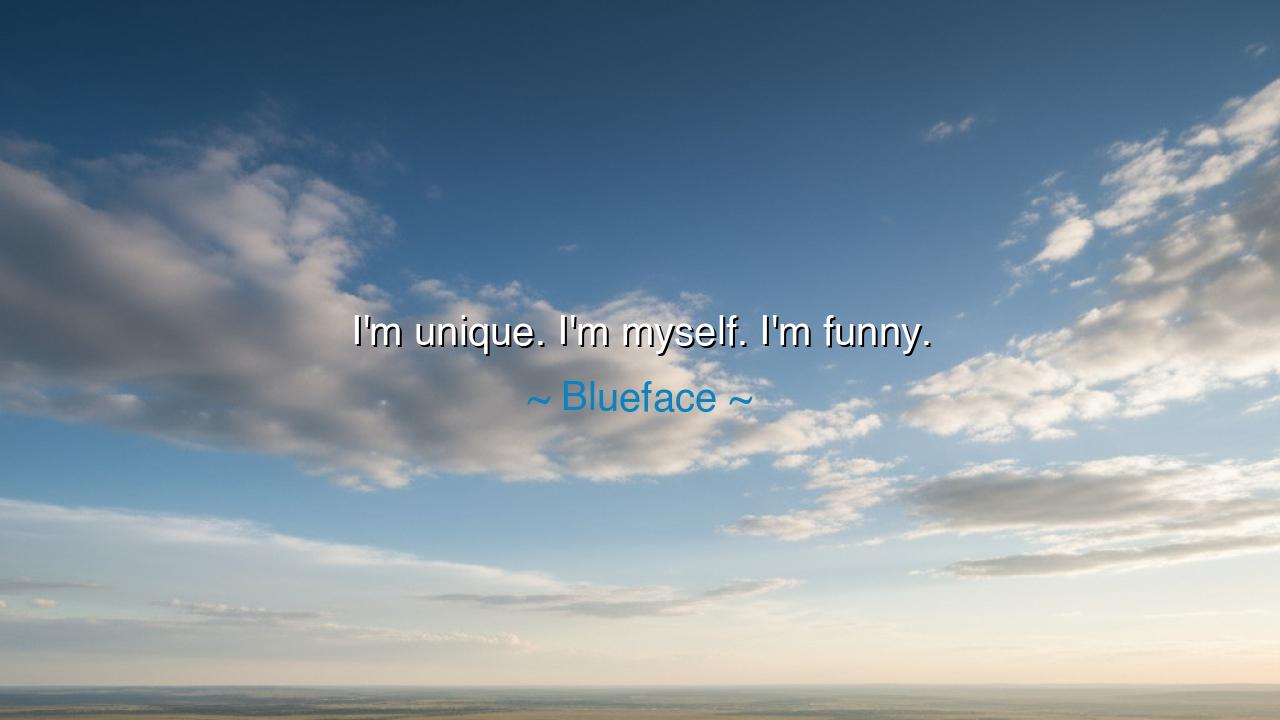
I'm unique. I'm myself. I'm funny.






“I’m unique. I’m myself. I’m funny.” — three short phrases, yet within them lies the cry of a soul that refuses to be drowned by the noise of the world. Blueface, in his unguarded honesty, spoke not as a poet cloaked in riddles, but as a man standing before the mirror of existence, declaring his own truth. These words are not boastful; they are a banner raised against conformity. For in every age, those who have dared to be themselves have shaken the world from slumber.
Long before Blueface uttered these words, the ancients too knew the power of uniqueness. The Greeks spoke of areté — the excellence that comes from fulfilling one’s own nature. The Chinese sages whispered of the Tao, the Way, which each being must walk in its own rhythm. And the prophets of old thundered that each star in the heavens shines by its own appointed light. To say “I’m unique” is to recognize that the Creator has sculpted no duplicate, that within every soul burns an unrepeatable flame. To betray that flame is to betray life itself.
The second phrase — “I’m myself” — resounds like the echo of ancient courage. In the face of countless voices demanding imitation, to remain oneself is an act of rebellion. Consider the tale of Diogenes, the philosopher who lived in a barrel. When Alexander the Great offered him anything he desired, Diogenes simply replied, “Stand out of my sunlight.” He sought nothing but his freedom to be himself, unchained by wealth or praise. In a world intoxicated with approval, his laughter became his throne. Thus, to be oneself is not a gentle choice; it is the boldness to walk the earth uncloaked.
Yet it is the third phrase — “I’m funny” — that unveils the light within defiance. To laugh at oneself, to find humor in one’s own imperfections, is the highest form of wisdom. The fool mocks others; the wise man smiles at his own folly. Even the mighty Socrates, on the day of his death, jested with his friends, reminding them that the soul must not lose its laughter even before the cup of poison. Humor, then, is not trivial — it is sacred resilience. It is the laughter of a free spirit that cannot be broken by circumstance.
Together, these words form a trinity of self-mastery: uniqueness as the mark of identity, authenticity as the path of life, and humor as the shield of the spirit. They teach us that greatness is not found in imitation but in acceptance — of one’s voice, one’s rhythm, one’s light. In every generation, there are those who bury their essence to please the crowd, and those who rise like flames, daring to live unfiltered. The latter become the architects of history.
From this teaching we learn a timeless lesson: comparison is the thief of joy, and conformity the silent grave of the soul. To live fully, one must embrace the awkwardness of being different, the courage of standing alone, and the grace of laughing through it all. The mountain does not envy the sea, nor the eagle the lion; each fulfills its destiny by being wholly what it is.
Therefore, let this be your daily practice: each morning, speak aloud your own version of this creed — “I am unique. I am myself. I am funny.” Let it be both armor and compass. Dare to dress as your spirit desires, to speak without fear, to find laughter even in your missteps. For the world does not need another copy; it needs the light that only you can give. And when you walk thus — with honesty, with humor, with unshakable selfhood — you will not merely live; you will become timeless.






AAdministratorAdministrator
Welcome, honored guests. Please leave a comment, we will respond soon